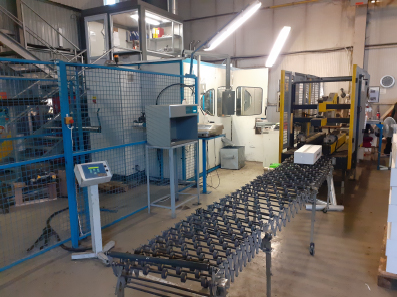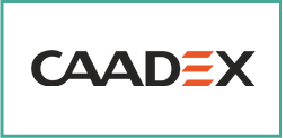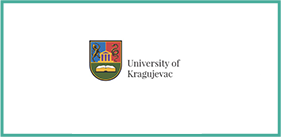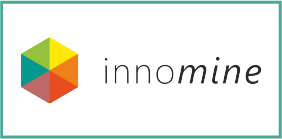Motivation
CAADEX, the end-user in this experiment, owns multiple complex machines with life cycles of tens of years. One of the complex machines produces snow guards for the roofs. It is able to produce 3000 snow guards within 8 hours.
While one piece of product weighs only 0.18 kg, the required raw material can only be ordered in large quantities (24.000 kg). Additionally, customers usually need a minimum of 5 different colours, resulting in a minimum raw material order of 120 tons. Moreover, each roof tile producer has its own specific type of product and therefore CAADEX currently produces 150 different types of roof snow guards in a quantity of 1,500,000 kg.

CAADEX production line
Machine switchover times cause major delays (usually 4-5 hours), and the number of threads is also high (12 daily). To reduce the switchovers, synchronization of machines is needed. CAADEX is willing to invest in new machines, but optimization is a key challenge. The experiment targets the optimization of CAADEX manufacturing processes by using the software of DSS (ISV) for simulation and modelling. DSS developed a discrete event simulation model in the cloud, which could be customized and used for the case of CAADEX to optimize the operation of the two machines. It will collect data and prepare simulations (digital twins).
Purpose of the Experiment
As a result of the experiment, CAADEX will be able to reduce switchover times and increase the efficiency of the production line. At the same time, this will allow CAADEX to better measure the process and collect information about the whole manufacturing process, which will result in better control of the operation.
Specific research will be conducted to optimize the algorithm, to reduce the number of scenarios, allowing the optimization tool to consume less energy, fewer cloud resources, and therefore also protect the environment. DSS’s optimization model will be run in the cloud to allow quick response times, and it will also be customized to the needs of CAADEX.
One major area of customization will be cutting off the unlikely scenarios in order to save time on the calculations, especially in this complex and multistep production process. This goal will be achieved by a pre-filtering algorithm, which will optimize the number of potentially useful simulations. The University of Kragujevac will provide specific expertise to this aspect of the project.
Technical Impact
The use of the DSS’s solution, the targeted application developed in the project, will bring value not only to the shop floor but also to management levels. CAADEX will be able to increase the accuracy and reduce the response time of order confirmation. Based on the output of the software, CAADEX will be able to visualize the material flow and detect the bottlenecks of manufacturing steps. This will also bring the possibility to run what-if scenarios and find new business models (such as T&M-based manufacturing, or manufacturing-as-a-service model) to optimize the utilization of production lines/machines.
Expected Economic Impact
As a result of successfully completing the experiment, CAADEX will be able to operate with a much smaller quantity of stocks, which will increase the efficiency of the whole company. The software provided by DSS will support future human resources development and optimization efforts, and it will highlight the surplus of operator capacities.
An additional important value of the production scheduling application is that the maintenance team could create accurate maintenance schedules in line with short and medium-term order volumes. The software will be able to provide answers to the suddenly occurred challenges, such as the lack of operators (due to sickness), machine shutdown, or out of base material.
Project Partners
CAADEX
is a manufacturer of roofing products.
DSS
is specializing in Business Intelligence systems, implementing analytical solutions and customized applications:
FSUKG,
University of Kragujevac will cut out unnecessary scenarios from the optimization reducing the needed resources to run the optimization.
Innomine
as the Digital Innovation Hub coordinates the implementation of the experiment and identifies synergies.





